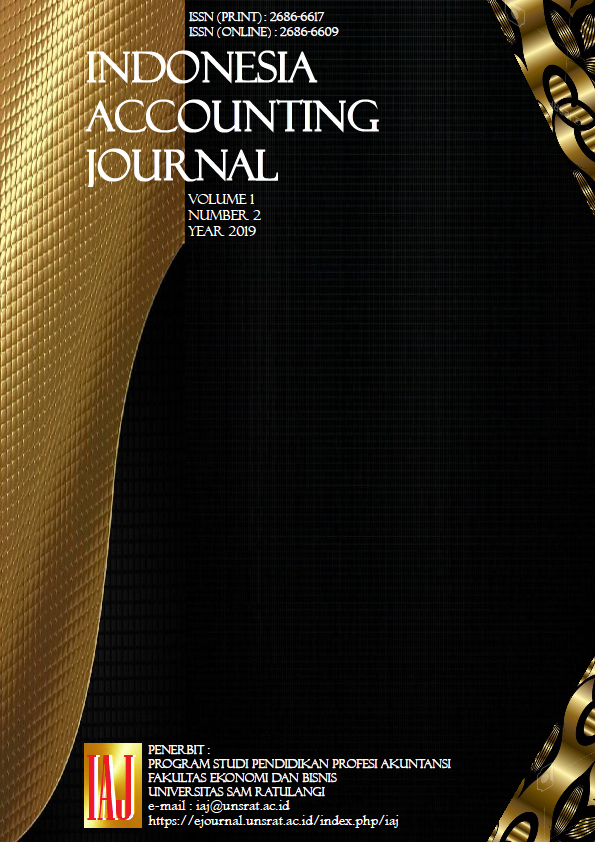Analisis perlakuan akuntansi aset tetap pada Badan Pengelola Keuangan dan Barang Milik Daerah Kota Manado
DOI:
https://doi.org/10.32400/iaj.26656Keywords:
fixed assets, government accountimg standards, accrual based, government accounting standard, technical bulletinAbstract
The main task of government agencies is to provide services to the community whose quality can be improved by the use of fixed assets to achieve the duties and functions of government agencies. The presence of Government Regulation (PP) of the Republic of Indonesia Number 71 Year 2010 concerning Accrual Based Government Accounting Standards is the momentum of changes in Government Accounting Standards from previously cash-based to accruals, to accrual-based and have major implications for the treatment of assets where depreciation is taken into account in the valuation of fixed assets. The purpose of this research is to find out the accounting treatment of Fixed Assets that are applied to the Regional Finance and Asset Management Agency (BPK-AD) of Manado City in accordance with Government Regulation No. 71 of 2010 statement No. 07. The research method used in this study is qualitative research. The results showed that the recognition of fixed assets, measurement or valuation of fixed assets, and depreciation of assets in the BPK-AD Manado City are in accordance with SAP No. 07, as well as the Manado City BPK-AD in the management of regional assets following a separate regulation made by the Manado city BPK-AD namely the Technical Bulletin (Bultek) as a reference to regulate and adjust regional asset management in accordance with SAP No. 07.References
Halim, A., & Kusufi, S. (2013). Akuntansi Sektor Publik – Akuntansi Keungan Daerah. Edisi Keempat. Jakarta. Salemba Empat.
Hariadi, M., Nangoi, G. B., & Wangkar, A. (2018). Evaluasi Penerapan Perlakuan Akuntansi Terhadap Aktiva Tetap Berdasarkan PSAK No.16 Pada PT Pegadaian (PERSERO) Cabang Malalayang Manado. Going Concern: Jurnal Riset Akuntansi. 13(02).https://ejournal.unsrat.ac.id/index.php/gc/article/view/19194
Kieso., Donald., Jerry, J., Weygandt., & Warfield, D. (2016). Intermediate Accounting. 16th Edition. New York
KSAP. (2010). Buletin Teknis Standar Akuntansi Pemerintah No.09 Tentang Aset Tetap. Jakarta.
Mahsun. (2013). Akuntansi Sektor Publik. Edisi Ketiga. Yogyakarta. BPFF.
Masipuang. Y., Ilat, V., & Pinatik, S. (2015). Analisis Perlakuan Akuntansi Aset Tetap Pada Badan Kepegwaian Dan Diklat Kota Manado. Journal GOING CONCERN. 10(03), 45-55. https://doi.org/10.32400/gc.10.3.8444.2015
Nordiawan, D., Putra, I., & Rahmawati, M. (2012). Akuntansi Pemerintahan. Jakarta: Salemba Empat.
Peraturan Menteri Dalam Negeri Nomor 19 Tahun 2016 Tentang Pedoman Pengelolaan Barang Milik Daerah. Jakarta.
Peraturan Pemerintah Nomor 58 Tahun 2005. Pengelolaan Keuangan Daerah. Jakarta.
Peraturan Pemerintah Republik Indonesia Nomor 71 tahun 2010. Standar Akuntansi Pemerintahan.
Putra. T. M. (2013). Analisis Penerapan Akuntansi Aset Tetap Pada CV. Kombos Manado. Jurnal Riset Ekonomi, Manajemen, Bisnis dan Akuntansi. 1(3) https://ejournal.unsrat.ac.id/index.php/emba/issue/view/362
Sugiyono. (2009). Metode Penelitian Bisnis. Bandung: Alfabeta.
Surya, R. A. S. (2012). Akuntansi Keuangan Versi IFRS.Edisi Pertama. Yogyakarta: Graha Ilmu.
Tanjung, A. H. (2013). Akuntansi Pemerintahan Daerah Berbasis Akrual, Cetakan Kedua. Bandung: Alfabeta.
Undang-Undang Republik Indonesia Nomor 23 Tahun 2014 Tentang Pemerintahan Daerah. Jakarta
Downloads
Additional Files
Published
Issue
Section
License
The articles published in Indonesia Accounting Journal are licensed under Creative Commons Attribution 4.0 International License with authors as copyright holders.
Â

This work is licensed under a Creative Commons Attribution 4.0 International License.
Â
Under this license then authors free to:
- Share — copy and redistribute the material in any medium or format.
- Adapt — remix, transform, and build upon the material for any purpose, even commercially.
Under the following terms :
- Attribution — You must give appropriate credit, provide a link to the license, and indicate if changes were made. You may do so in any reasonable manner, but not in any way that suggests the licensor endorses you or your use.
- No additional restrictions — You may not apply legal terms or technological measures that legally restrict others from doing anything the license permits.
Notices:
- You do not have to comply with the license for elements of the material in the public domain or where your use is permitted by an applicable exception or limitation.
- No warranties are given. The license may not give you all of the permissions necessary for your intended use. For example, other rights such as publicity, privacy, or moral rights may limit how you use the material.


